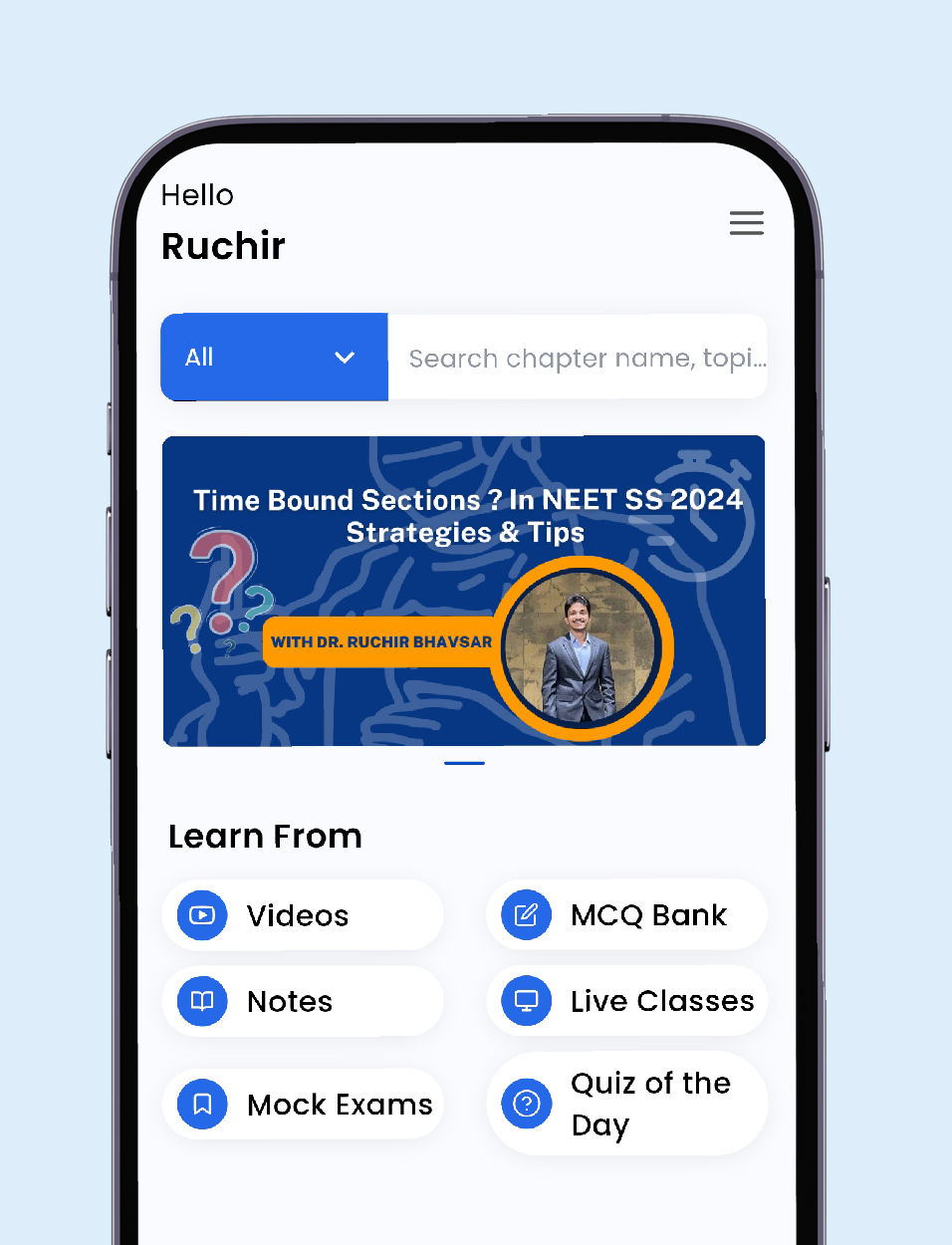By: Dr. Ruchir Bhavsar
With NEET SS 2024 just around the corner, it is critical to develop a solid preparation strategy, especially as the exam date of March 29-30, 2025, approaches. Whether you’re just starting or have been preparing for months, now is the time to gain momentum and focus on reaching that finish line.
Here’s a comprehensive guide to help you structure your study plan over the next five months and make the most of your preparation time.
Buckle Up and Maintain Momentum
For those starting now or who have already begun preparation, it’s essential to buckle up and maintain your drive. With the exam date in sight, now is not the time to lose focus. Instead, you should aim to gather additional momentum and push yourself to reach the finish line.
Setting Your Timeline
If today is September 15, you have exactly five and half months until March, leaving the final 1 month before the exam strictly for revision. This period is crucial for going over what you’ve already studied because you won’t have time to learn new material during those final days. So, the core preparation window is from September 15 to March.
Here’s what I recommend over the next five months:
- September 15 to December 15: Dedicated study and MCQ-solving time.
- Mid-December to March: Focus on revision.
I’ll outline what to focus on during these six months, including how to balance theory and MCQ practice and the importance of mock exams.
The Importance of Mock Exams
Mock exams are incredibly valuable during your preparation. These simulated exams will help you test your knowledge and allow you to experience the pressure of exam conditions. They will also serve as an important tool to identify weak areas. It’s essential to incorporate mock exams into your routine, especially as the exam date approaches.
Prioritizing Topics: What to Study First
The first step in structuring your study plan is deciding what to read. I’ve discussed this in previous sessions, but it’s essential to focus on core resources such as Bailey & Love’s Short Practice of Surgery, Sabiston Textbook of Surgery, and Schwartz’s Principles of Surgery.
Now, let’s break down the topics into priorities:
Priority 1 Topics:
These should be your initial focus in the first month (from September 15 to October 15):
- Basic Principles of Surgery and Neurosurgery
- Endocrine Surgery
- Vascular Surgery
- Pediatric Surgery
- Plastic Surgery
These are the topics that students may often overlook or neglect in favor of more commonly tested areas like gastrointestinal (GI) surgery or urology. However, these specialty areas require early attention because they are critical, and students tend to neglect them due to their heavy focus on daily clinical practice topics.
Structuring the First 90 Days: The Rule of Three
Divide your initial 90 days into three main sections, each lasting about one month. Your goal should be to tackle the Priority 1 topics in the first month and then move on to Priority 2 and Priority 3 topics. Remember, this isn’t just about the number of hours you dedicate to each topic but the order in which you approach them.
Why Prioritize in This Order?
The reason for this priority structure is to ensure that you cover the topics that might be neglected in routine preparation. GI surgery, for example, can be left for later because it is something many students are more familiar with. Start with the less familiar topics and work your way to those you are more comfortable with.
Priority 2 and 3 Topics:
Once you’ve completed the Priority 1 topics, move on to:
- Head and Neck Surgery
- Oncology
- Transplant Surgery
- Cardiothoracic Surgery
Finally, cover GI surgery (which falls into Priority 3). Since GI and urology are commonly covered in both theory and practice, many students find these areas easier to review closer to the exam date.
The Importance of Revision
From December onwards, make sure you reserve at least one and a half to two months for revision. Even if you complete your first round of preparation by December, this revision period is critical to consolidate your learning and strengthen areas of weakness. Aim for two and a half months of revision time to be fully prepared.
Study Schedule: Personalize Your Timeline
While I’ve outlined a general schedule, it’s important to personalize it according to your study habits and speed. Some may finish reading a chapter in half a day, while others might take two days. Make your study schedule based on your speed, dividing it into monthly, weekly, and daily tasks.
Balancing MCQs and Theory
A common question many students ask is how much time to dedicate to MCQ solving versus theory. During the first 90 days, aim for a 50-50 split between theory reading and MCQ solving. This is crucial because simply reading the theory without practicing questions will not give you the competitive edge needed for NEET SS.
- MCQs: Aim to solve 100 to 150 questions per day. You can use a practice mode or test mode for this. In test mode, try solving questions in two-and-a-half-hour blocks.
When solving MCQs, it’s a good idea to revisit topics you studied a week or ten days ago, rather than questions on topics you studied that same day. This will improve your retention.
Key Takeaway: Build a Strong Foundation Early
Focus the first 90 days on building a strong foundation by covering the Priority 1 topics first. As you move through Priority 2 and 3 topics, you’ll find that your revision phase (from December to March) will be smoother. Also, maintain a balance between theory and MCQs throughout your preparation to ensure you are fully prepared for NEET SS 2025.
Stay focused, divide your study schedule strategically, and incorporate mock exams regularly to track your progress.
Daily MCQ Solving: Train Your Mind
As part of your preparation strategy, it’s essential to train your mind to solve MCQs under exam conditions. With the availability of various platforms, including our Windows and macOS apps, you should practice solving questions on a laptop. This not only prepares you for the actual exam environment but also helps you become accustomed to focusing in front of a screen for extended periods.
I recommend a 50-50 split between reading and MCQ solving. You can practice using test mode for a more realistic exam simulation or use the practice mode for custom modules. For example, if you plan to solve 150 questions in a week, break it down into daily sessions of 150 questions and continue solving until you finish the module. You can even save your progress and responses, making practice sessions more efficient.
Increasing MCQ Solving as You Progress
As you approach your revision phase, increase your MCQ solving by 10%. By doing so, you shift more focus toward revision and rapid reviews. During this phase, you’ll spend less time reading new material and more time revisiting topics. This means that your MCQ solving will rise to about 60%, while your reading time reduces accordingly. This strategy ensures that you are revising more efficiently without sacrificing the necessary focus on theory.
The Importance of Delayed MCQ Solving
One of the key strategies I advocate is delayed MCQ solving. Instead of solving MCQs on the same day you study a topic, give yourself a gap of 7-10 days before attempting questions on that material. This gap improves retention and helps you identify weak areas more effectively. For example, if you study a topic today and solve MCQs a week later, you are effectively doing mini-revisions. This approach helps you retain information for a longer time and strengthens your understanding.
Mock Exams: A Game-Changer
Mock exams are a critical part of your preparation, allowing you to simulate real exam conditions, track your progress, and identify areas for improvement. We will be offering 15 mock exams, spread out over the next few months, with detailed analysis and ranking predictions based on the past NEET SS results of 2022 and 2023.
These mock exams are not just about solving questions—they are designed to give you valuable insights into your performance. You will receive detailed feedback on factors such as:
- Ranking trends over multiple exams
- Common mistakes like changing answers or misjudging time
- Strengths and weaknesses in specific topics
This data will help you fine-tune your preparation. Our mock exams will be held two to three times a month, with no more than two exams in March to allow for ample revision time before the main exam.
Integrating Mock Exams into Your Study Schedule
If you plan to take mock exams from multiple platforms, it’s crucial to integrate these into your existing study schedule. Don’t just randomly attempt exams on the day they are offered. Instead, plan your study sessions around the mock exam dates to ensure that the topics being tested are aligned with your study timeline. Mock exams should not hinder your theory preparation; they should complement it by helping you identify weak areas.
After taking a mock exam, don’t let a low score discourage you. Analyze your mistakes and understand why you got a question wrong. Mock exams are practice tools, not final judgments of your knowledge. They help you identify weaknesses and give you time to improve.
Use the Right Platform: Desktop vs. Mobile
Always take mock exams on a desktop or laptop, as this mimics the actual exam environment. Avoid using mobile devices, as notifications and distractions like calls or messages can interfere with your concentration. Treat every mock exam as a real one, with the same level of seriousness and focus. Whether you take 15, 30, or even daily exams, the goal is to improve progressively.
Analyzing Mock Exam Results
After each mock exam, don’t rush into reviewing the answers immediately. If you’re feeling mentally drained after the exam, take a break and review the answers the next day. Divide the review process into smaller sessions, going over 20-30 questions a day, rather than overwhelming yourself by reviewing the entire exam in one go. Track your performance over time to see if your scores are improving, staying consistent, or decreasing. If your performance is plateauing or declining, take corrective action by focusing on weaker topics.
Detailed Performance Analysis
Our platform will provide a detailed analysis of your performance in each mock exam, including:
- Comparative rankings based on NEET SS 2022, 2023, and predicted 2024 performance
- Insights into your strengths and weaknesses on a topic-wise basis
- Identifying areas where you tend to make mistakes, such as changing answers
- Predictive ranking based on performance trends
This data will be instrumental in shaping your study plan moving forward, ensuring that you focus on the areas that need the most attention.
The Right Balance Between Theory and MCQ Solving
As you move closer to the NEET SS exam, the balance between theory and MCQ solving may shift. For those still preparing for their theory exams (such as MS or DNB exams), I recommend a 60-40 split, with more emphasis on theory reading. After your theory exams, switch back to a 50-50 ratio, or even increase the percentage of time spent on MCQs as you approach the NEET SS.

Using Our Resources to Maximize Your Preparation
We are here to help you through every step of your preparation. Our MCQ bank, with both test mode and practice mode, is designed to help you sharpen your problem-solving skills. Use our notes and video content for rapid revision, especially if you have already studied the core materials like Bailey & Love or Sabiston. Our videos, particularly the shorter, focused ones, are perfect for quick reviews. For those looking to deepen their knowledge, Schwartz’s content is an excellent supplement that will give you an additional 10-15% edge in your preparation.
By combining our MCQ bank, notes, videos, and detailed analysis from mock exams, you will be able to approach NEET SS with a smart and efficient strategy, without the need to memorize everything.
Balancing Work and Study: Time Management is Key
If you’re working while preparing for NEET SS, it’s essential to manage your time wisely. Whether you have two, four, or six hours a day to study, the key is to give 100% of your attention during that time. Your study schedule should be customized to fit your daily routine and energy levels. Instead of trying to follow a rigid plan, create a flexible schedule that allows you to maximize your study time, however limited it may be.
As I mentioned earlier, there’s no “one-size-fits-all” approach to NEET SS preparation. Each person studies at a different pace, and it’s important to adapt your plan based on your unique needs. If you’re able to give your maximum effort during the time you have available, you’ll still be able to make significant progress.
Choosing Between Multiple Exams: NEET SS vs. INI SS
If you’re preparing for both NEET SS and INI SS, it’s important to prioritize one exam over the other. The INI SS exam may be in October, and if you haven’t already started preparing, it’s unrealistic to expect to cover the entire syllabus in just one and a half months. However, you can still prepare the General Surgery topics and attempt INI SS to gauge your level in these areas.
Ultimately, choose one exam to focus on and give it your all. For most, it’s advisable to concentrate on NEET SS if you feel you don’t have enough time to fully prepare for INI SS. Attempting to prepare for both without a clear focus might divide your attention and reduce your chances of performing well in either exam.
The Ideal Number of Revisions: How Many is Enough?
In terms of revisions, the ideal number is two to three rounds of full revision before the exam. While revising even once can be sufficient if done thoroughly, I strongly recommend completing at least two revisions. These revisions should focus on consolidating the material you’ve already studied, strengthening your memory, and fine-tuning your understanding of key concepts.
If time permits, aim for a third revision, particularly in the last few weeks before the exam, when rapid revision becomes crucial. During these final weeks, focus on the high-yield topics and mock exam reviews to solidify your knowledge.
Final Thoughts on NEET SS 2024 Preparation
The path to success in NEET SS is not about simply studying harder but studying smarter. By following a structured approach that includes topic prioritization, effective MCQ solving, regular mock exams, and consistent revisions, you can maximize your chances of success.
Remember, everyone’s journey to cracking NEET SS is different, and what works for one person may not work for another. Focus on your own preparation pace, utilize the resources at your disposal, and ensure that you keep a positive mindset throughout the process.
Now that you have a detailed roadmap for the next six months, it’s time to commit to your preparation with full focus and confidence. Best of luck with your NEET SS 2024 preparation—stay consistent, stay positive, and aim for the top!





